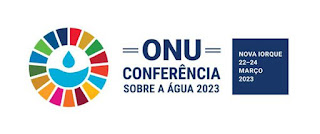Waters, Education, History and Arts
Link Zoom
and YouTube
https://us02web.zoom.us/j/84572445205?pwd=NGs1dFp2MXdvRk15ZkFMSEpOVFRZdz09
Day
20-3-2023 at 7:30 pm – Brasilia time
Side event
of the UN Conference on Water – 2023
The Maria
Helena Andrés Institute organized this side event of the UN Conference on Water
in 2023, to show the importance of artistic language as a tool to develop the creative
potential and raise awareness about WATER. We present the work of visual
artists, musicians, poets, historians, educators, architects, photographers,
videomakers and ecologists.
In the
first part, lasting 25 minutes, we group the contributions focused on the
relationship between Water and Life. We take as examples the paintings of Maria
Helena Andrés and Bax; the musical clip video Água by the group Voz &
Poesia; the book Water Speaks of Maurício and Aparecida Andrés, illustrated by
MHA; photographs of clouds, by Maurício Andrés; the songs about water and
clouds by Artur Andrés; videos by Fabricio Fernandino (Aqua) and João Diniz
(Waterfeel). We present actions carried out with children by Eliana and Maria
Helena Andrés, who emphasize the importance of art as a tool to develop the
creative potential of children, young people and adults.
In the second part, lasting 30 minutes, we
present contributions related to the death and rebirth of rivers. It begins
with Fabricio Fernandino's video about The river of Deaths. Hydroalienation is
shown in attempts to kill urban rivers (hydrocide) through water pollution and
urban interventions that buried them alive under the asphalt. The projects This
street has a river (coordinated by Thereza Portes- Instituto Undió), and the
work of Isabela Prado (Over/About the river: Between rivers and streets) show
that rivers remain alive in memory and reappear in artistic interventions. This
part ends with two contributions focused on the rebirth of urban rivers through
hydro-awareness, such as those presented in the educational project Esse Rio é
Meu by Silvana Gontijo, and in the book The Sanitation Epic, by Márcio Santa Rosa and
Aspásia Camargo.
Realization
Institute
Maria Helena Andrés
Between
rivers and streets
Undió Institute
Planetapontocom
UN approved side event








Nenhum comentário:
Postar um comentário